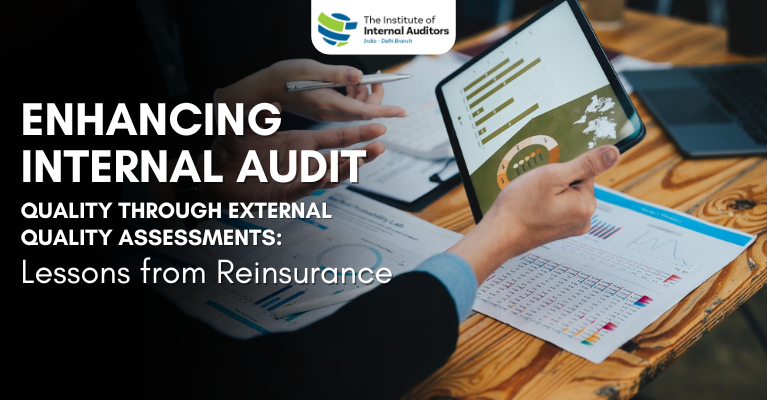External Quality Assessments (EQAs) are critical and indispensable for ensuring internal audit services adhere to global standards and deliver significant value to stakeholders in complex and rapidly evolving risk management industries like reinsurance. This article explores how EQAs enhance internal audit quality and professional development, drawing on experiences with PrimeRe Insurance Ltd., a hypothetical reinsurance company, to address unique reinsurance challenges and align with the Global Internal Audit Standards (Standards). PrimeRe Insurance Ltd (company) is a mid-sized reinsurance company based in Wyoming, U.S. The company underwrites reinsurance policies for corporate clients in various sectors within a competitive market.
Quality in internal auditing refers to a professional mandate to meet stakeholders’ expectations by adding value, improving operations, and fulfilling responsibilities in conformance with Standards. An independent assessor validates the internal audit’s quality by assessing an internal audit function’s conformance with the Standards and achievement of predefined performance objectives. EQA is not just about compliance; it also focuses on the internal auditors’ competency, systematic and disciplined approaches to adding value, delivering outstanding services, and commitment to continuous improvement. Internal auditors must possess the right competencies to enhance quality. EQA can validate whether an internal audit function possesses or obtains the competencies to improve an organisation’s capability to manage risk while creating, protecting, and sustaining value.

The reinsurance industry faces unique risks that set it apart from primary insurance and other sectors, in addition to the widespread threat of cyber, geopolitical instability, economic volatility, supply chain, operational resilience, regulatory and legal risks. Reinsurance risks include accumulation, catastrophe, counterparty credit, retrocession, tail, and basis risks. The EQA team at PrimeRe Insurance Ltd evaluates whether the internal audit function’s risk-based plan considers and addresses the company’s goals, strategies, key business objectives, unique reinsurance risk and those required for consideration by regulators, risk management processes, board and management’s interests, and internal audit capabilities to deliver on its mandate.
Standard 8.4 (External Quality Assessment) requires the Chief Audit Executive (CAE) to plan and discuss an EQA with the board. An independent assessor or assessment team must evaluate the internal audit function at least every five years, though more frequent assessments are encouraged. At least one assessor must hold an active Certified Internal Auditor (CIA) designation to ensure familiarity with the Standards. The EQA includes a comprehensive review of the adequacy and effectiveness of all aspects of the internal audit function and alignment with organisational goals. EQA helps identify skills gaps by examining the qualifications and competencies of internal auditors, the tools and techniques they use, and how they ensure continual development.
To evaluate how effectively the internal audit function at PrimeRe Insurance Ltd addresses reinsurance-specific risks, the EQA team adopted a structured and comprehensive approach to assessing the internal audit’s responses to the company’s unique risks by focusing on:
- Alignment with strategic and regulatory expectations
- Coverage of reinsurance-specific risks
- Evaluation of risk management integration
- Audit execution and methodology
- Capability and competence
- Reporting and follow-up
- Continuous improvement
During the 2022 quality assurance review of the approved risk-based audit plan, which includes Counterparty Credit Risk (CCR), the EQA team identified significant deficiencies in the audit planning process. The EQA team observed that the company’s audit team relied too much on standardised checklists and past data, lacking a dynamic, risk-based approach to address changing counterparty exposures. The findings include inadequate risk assessment (identification, analysis, and evaluation), a skills gap in audit staff, and static audit frequency.
The EQA team recommended adopting a risk based audit framework to facilitate a dynamic audit planning process that prioritises risks according to specific risk indicators. They also suggest improving training programmes to focus on risk-based auditing for specific reinsurance risks. The feedback on auditors’ competencies concerning reinsurance risks identified development areas. The EQA review emphasised the need for a tailored learning programme, fostering a culture of learning, adaptability, and ongoing professional development.

Given current global technology and innovation trends, I believe EQA will utilise advanced technologies, particularly Artificial Intelligence driven assessments, to tackle industry-specific challenges, enhance audit relevance, and identify the competencies needed for future-ready internal auditors over the next decade.
EQA is a catalyst for excellence and growth in internal auditing. When conducted by a qualified and independent assessor or assessment team who adheres to the IIA Standards, it will provide an objective perspective for internal audit functions to assess their performance against globally recognised best practices in internal auditing, strengthening internal audit’s alignment with organisational strategies and objectives, nurturing a culture of continuous improvement, elevating credibility and stakeholder confidence, optimising identification of strengths and opportunities, driving professional development and a culture of excellence.
About the author:
Prog. Alaba Awolaja
Chief Managing Consultant, GOARISC & Oversight Professional Services Ltd.
alaba.awolaja@goarisc.com
Prog. Alaba Awolaja, CIA®, CCFI, serves as Chief Managing Consultant at GOARISC & Oversight Professional Services Ltd in Lagos, Nigeria. With over eighteen years of expertise spanning banking, financial services, internal auditing, governance, risk management, and consulting, he is widely recognised as a global thought leader. Honoured by Richard Chambers, former President and CEO of The IIA Inc., as Global Internal Audit Thought Leader of the Year in 2020 and recipient of the Internal Audit Beacon Awards in 2021 and 2022, Alaba is celebrated by both the IIA and AFIIA. He is a sought-after speaker and a leading influencer in the internal audit profession.

